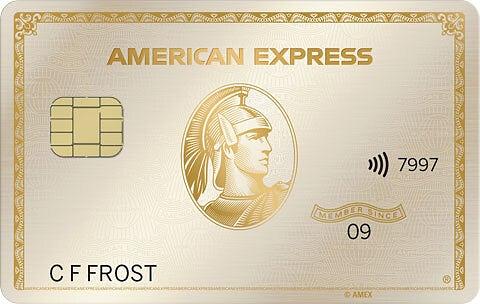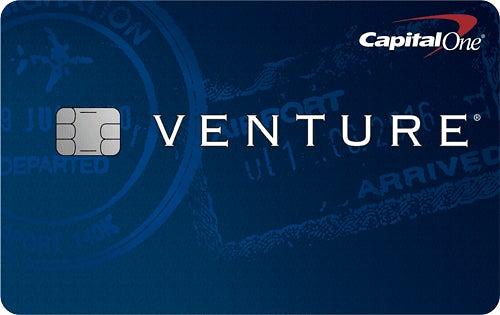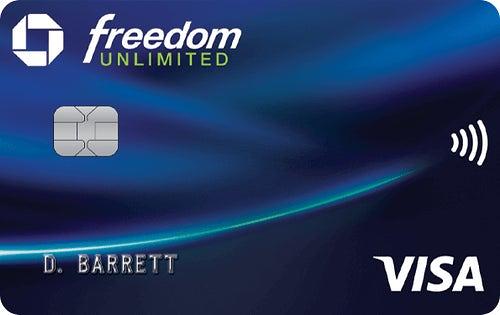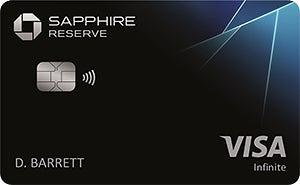A great sign-up bonus is one of the biggest perks of opening a new credit card. Plus, sign-up bonus offers cover a broad range of budgets, rewards types, and timelines. The list below can help you find the best welcome offer to maximize your spending and ensure you never miss out on a great deal.
Best credit card sign-up bonuses
Annual fee: $550
Welcome offer: Earn 60,000 bonus points after spending $4,000 within the first three months
Rewards:
-
10x points on eligible hotel and car rental purchases through Chase Travel℠*
-
10x points on Chase Dining purchases
-
5x points on flight purchases through Chase Travel*
-
3x points on dining
-
3x points on all other travel purchases*
-
1x points on all other purchases
*Applies after the first $300 you spend on travel annually
Recommended credit score: Excellent
More details: You’ll get up to $300 in statement credits each year for travel purchases you make with your card and begin earning rewards on eligible travel purchases after you max out the annual credits. The Chase Sapphire Reserve also gets you airport lounge access, up to $100 in credits every four years for TSA PreCheck or Global Entry fees, monthly credits and membership with partner brands (like DoorDash, Instacart, and Lyft), and more.
Why we like it: When it comes to dollar value for your bonus points, it’s tough to beat the Chase Sapphire Reserve. It has a welcome offer of 60,000 points after spending $4,000 within three months — which is in line with other travel credit cards that have an annual fee. But with those points, you can potentially get an outsized value when using them for travel.
When you redeem your Chase Ultimate Rewards points for travel through Chase, you can get a 50% boost in value. In other words, each point is worth 1.5 cents — making the 60,000-point welcome offer worth up to $900 in travel. With a bonus that high, you could get a few free nights at a hotel or even a round-trip flight to your next destination.
Even after the bonus offer ends, the Chase Sapphire Reserve is a great premium option for frequent travelers. The $300 annual travel credit brings the effective cost down to $250 per year. And with the ongoing 1.5x boost on travel redemptions, you can continue to maximize your points when you book trips through Chase.
Read more: Chase Sapphire Reserve full review
Related:
Annual fee: $0 introductory fee for the first year, then $95 (see rates & fees)
Welcome offer: Earn a $250 cash bonus after spending $3,000 within the first six months
Rewards:
-
6% cash back at U.S. supermarkets (up to $6,000 spent per year, then 1%)
-
6% cash back on select U.S. streaming subscriptions
-
3% cash back on transit
-
3% cash back at U.S. gas stations
-
1% cash back on all other purchases
Cash back is received in the form of Reward Dollars that can be redeemed as a statement credit or at Amazon.com checkout.
Recommended credit score: Good to excellent
More details: In addition to ongoing cash rewards, you can get up to $84 annually ($7 per month in statement credits, with enrollment) when you use your card for an eligible auto-renewing Disney Bundle subscription. There’s also an 0% APR introductory period for new purchases and balance transfers for the first 12 months (19.24% – 29.99% variable APR after that).
Why we like it: The Blue Cash Preferred has a valuable trio of introductory offers for new cardholders, between the cash welcome bonus, 0% APR introductory offer, and promotional $0 annual fee (typically $95) for the first year (see rates & fees).
Among all of the cash-back credit cards we compared with great sign-up bonuses, the Blue Cash Preferred’s $250 welcome offer at the peak for bonus cash value. You’ll also have a full six months to meet the $3,000 spending requirement (equal to about $500 per month). By comparison, many welcome bonuses from cash-back cards top out around $200.
As a first-year cardholder, don’t forget to maximize the added value of an introductory 0% APR if you have a large upcoming purchase or existing debt. The Blue Cash Preferred also has everyday rewards categories that make it ideal for long-term value — as long as the rewards you earn each year are enough to cancel out the ongoing annual fee. Compare your regular spending to your potential annual cash back rewards to make sure you’ll earn more each year than the cost of this card.
Annual fee: $0
Intro offer: Get a 0% intro APR on new purchases and balance transfers for 21 billing cycles, after which the standard APR will apply
Rewards: N/A
More details: If you want to use this card for a balance transfer, you’ll need to transfer your balance within 60 days of account opening; you’ll also pay a fee of 5% or $5, whichever is greater. The U.S. Bank Visa Platinum also offers up to $600 in cell phone protection against damage or theft when you use the card to make your monthly cell phone payments.
Why we like it: Not every new card offer is cash back or points-based. Depending on your financial situation and goals, you may get even more value from a great 0% APR offer for new cardholders. The U.S. Bank Visa Platinum Card carries one of the longest introductory 0% APR offers for both new purchases and balance transfers available right now.
With a 0% APR lasting for 21 billing cycles, you won’t have to worry about your balances accruing interest until 2026. If you have a large upcoming purchase to make and want extra time to pay it off, for example, this card can give you a lot of flexibility. Just pay down any remaining balances before the introductory period ends, or else you’ll risk taking on the card’s ongoing variable APR — a high rate that can quickly lead to steep interest charges.
Annual fee: $0
Welcome offer: Earn an extra 1.5% cash back on every purchase up to the first $20,000 spent in the first year (up to a $300 value)
Rewards:
-
5% cash back on travel through Chase Travel
-
3% cash back on dining
-
3% cash back on drugstore purchases
-
1.5% cash back on all other purchases
Recommended credit score: Good to Excellent
More details: Along with cash rewards, the Chase Freedom Unlimited offers a solid 15-month introductory 0% APR on both new purchases and balance transfers (20.49% – 29.24% variable APR after that), and you’ll get some added partner benefits from brands like DoorDash, Instacart, and Lyft. You can redeem the rewards you earn for travel through Chase Travel, as well as standard cash back.
Why we like it: The Chase Freedom Unlimited is the only no annual fee cash-back credit card among those we compared that offers a potential $300 welcome bonus. This offer is different from many standard sign-up bonuses, though. Instead of a spending requirement over a few months’ time, you’ll get 1.5% added to your regular rewards, up to $20,000 spent in the first year. With the card’s rewards categories, that looks like:
-
6.5% cash back on travel through Chase Travel
-
4.5% cash back on dining
-
4.5% cash back on drugstore purchases
-
3% cash back on all other purchases
In other words, you can earn a minimum of 3% cash back on every purchase for the first year (up to the $20,000 spending limit). Of course, to maximize this bonus, you’ll need to spend up to the maximum — equivalent to about $1,667 in purchases each month. If that’s over your regular budget, you may need to forfeit some of the potential welcome bonus value to avoid overspending on the card.
Annual fee: $0
Welcome offer: Earn an Unlimited Cashback Match — Discover will automatically match all the cash back you earn in your first year
Rewards:
-
2% cash back at gas stations and restaurants (up to $1,000 in combined spending each quarter, then 1%)
-
1% cash back on all other purchases
More details: This secured credit card doesn’t require a credit check, but you’ll need to put down a security deposit of at least $200 (and up to $2,500) to open your account. The deposit is refundable and will act as your credit limit. In as few as seven months, Discover will automatically review your account to determine whether you qualify to upgrade to an unsecured card and get your deposit returned.
Why we like it: It’s rare to find a secured credit card with a welcome bonus at all — let alone one with as much potential value as the Discover it Secured offers. This card’s Cashback Match welcome bonus is the same as on any Discover card: At the end of your first year, Discover will match all of the cash back you’ve earned so far.
Say you put down a security deposit of $1,000 when opening the card. Each month, you put around $333 in gas station and restaurant purchases on your card and pay them off when your bill is due. This keeps your credit utilization relatively low and lets you max out the quarterly 2% bonus categories. Over the first year, it also leaves you with a total of about $80 in cash back. After the Cashback Match, you’ll get another $80 for a total of $160.
But in addition to the bonus and rewards, the Discover it Secured is a useful credit-building option for people with low credit scores or no credit history at all. Over time, you can enjoy the benefits of your cash-back earnings while also practicing good credit habits that will help you achieve and maintain a great score.
Annual fee: $250 (see rates and fees)
Welcome offer: Earn 155,000 Marriott Bonvoy bonus points after spending $5,000 within the first six months
Rewards:
-
6x Marriott Bonvoy points on eligible purchases at Marriott Bonvoy hotels
-
4x Marriott Bonvoy points at restaurants worldwide and U.S. supermarkets (up to $15,000 in combined spending per calendar year, then 2x)
-
2x Marriott Bonvoy points on all other purchases
Recommended credit score: Good to Excellent
More details: More benefits for Marriott Bonvoy customers include complimentary Gold Elite status, 15 Elite Night credits each calendar year, and a Free Night Award after you spend $15,000 on qualifying purchases with your card in a calendar year. You’ll also get a 1,000-point bonus for every stay you book with Marriott Bonvoy at eligible properties.
Why we like it: The Bonvoy Bevy’s 155,000-point welcome offer puts it among the highest available bonuses today by face value. Marriott Bonvoy uses dynamic pricing, so it can be difficult to pin down an exact monetary value for the bonus. The number of points required for an award night depends on when you book, where you travel, and what time of year you go.
When we checked in late April, this card’s bonus was enough to cover a three-night hotel stay at the Aloft or AC Hotel in Miami over Labor Day weekend and nearly enough (you’ll need 5,000 extra points) to cover the three nights ahead of Thanksgiving at the Courtyard in downtown Seattle.
If you’re a Marriott regular, you may also want to consider the Marriott Bonvoy Brilliant® American Express® Card and its welcome offer of 185,000 bonus points after you spend $6,000 within the first six months. The Bonvoy Bevy is still our pick, though. Here’s why: To earn the Bonvoy Brilliant’s Marriott Bonvoy bonus points, you’ll need to make an extra $1,000 in purchases over the same time frame and commit to a $650 annual fee (see rates and fees; terms apply) — $400 more than the Bonvoy Bevy.
Considering the overall card details, we believe the Bonvoy Bevy offers the greater short- and long-term value for most Marriott loyalists.
Related:
Annual fee: $95
Welcome offer: Buy one ticket, get another one free (plus taxes and fees from $23) and earn 50,000 bonus miles after spending $3,000 within the first 90 days of account opening
Rewards:
-
3x miles on eligible purchases with Alaska Airlines
-
2x miles on eligible gas, EV charging station, and local transit purchases (including rideshare)
-
2x miles on eligible cable and streaming services
-
1x miles on all other purchases
More details: As a cardholder, you’ll get a free checked bag, priority boarding, and 20% off in-flight purchases when you fly Alaska Airlines. If you’re also a Bank of America customer with an eligible account, you’ll get a 10% bonus on all the miles you earn through your spending — in other words, for every 10,000 miles you earn, you’ll get an extra 1,000.
Why we like it: The Alaska Airlines Visa Signature card’s welcome offer is extra valuable because it’s two-fold. After meeting the spending threshold, you’ll get both a bonus miles boost and a free companion ticket. The 50,000 bonus miles alone are already competitive among many airline credit cards today. Airfare for short-haul flights starts at just 4,500 miles for an economy ticket; you can even find flights to Mexico, Central America, and the Caribbean starting as low as 10,000 miles. With 50,000 bonus miles, you can book a round-trip domestic flight and possibly even more.
Plus, you’ll save plenty of cash with the second part of this card’s bonus offer to buy one ticket and get another free. You’ll just pay the cost of taxes and fees, which start at $23. If companion passes are a big draw for you, you’ll also enjoy this card’s long-term value and your ability to earn Alaska’s Famous Companion Fare. Each account anniversary, you can earn Companion Fare as long as you make at least $6,000 in purchases with your card over the year prior. Companion Fare gets you one economy fare ticket for $99, plus taxes and fees starting at $23. You’ll need to purchase a ticket on the same itinerary and book at the same time (with your card) to use the Companion Fare.
Related:
What are credit card sign-up bonuses?
A credit card sign-up bonus is an incentive for new cardholders, offered in the form of cash, points, or miles rewards after you meet some requirements. You’ll often see sign-up bonuses referred to as welcome bonuses or welcome offers.
Unlike other credit card benefits, a welcome bonus is a one-time offer, and some are even boosted by limited-time offers. It’s not an annual perk that comes around every account anniversary; if you don’t earn it after you open a new card, you won’t get another chance later on.
Because welcome bonuses are one-time only, when you apply, it can make a difference. For example, you might apply for a new travel card a few months before you book an upcoming vacation so you can secure the bonus and use those points toward your flights and hotel. That way, you’ll save money and potentially score bookings that might otherwise be out of your budget.
How sign-up bonuses work
In most cases, you’ll earn a card’s welcome bonus after you spend a certain amount of money within a given timeframe.
A common rewards card bonus may offer 60,000 bonus points after you spend $4,000 within the first three months of account opening, for example. Alternatively, you might find an offer for $200 cash back after you spend $500 within the first three months.
This is the most common type of sign-up bonus, but there are others, too. Some credit cards, for instance, have extended offers lasting as long as a year. You might get a boosted rewards rate for the first year after opening your account or an offer to match your entire first-year earnings.
Depending on how much you spend, this type of offer could potentially be lucrative. But you also won’t get the instant gratification of a typical sign-up bonus, and may need to more strategically track your spending over the year to maximize the offer.
Introductory offers
Like cash-back or points-based credit card welcome bonus offers, cards with introductory 0% APR offers can add a lot of value to your first-year spending. You can even find a great sign-up bonus and a solid promotional APR offer from the same credit card.
Promotional 0% APRs apply to new purchases or balance transfers (or both) for a limited time. Today, the introductory period for these 0% APR offers typically last from 12 months to 21 months. If you’re using the intro period to pay down an existing balance, you may also need to pay a balance transfer fee (usually 3% to 5% of your transferred balance).
Are sign-up bonuses worth it?
Sign-up bonuses may seem like a windfall of cash or points directly into your account, but they can also take a lot of money and time to earn. And if a card’s only real value to you is the bonus — without much to offer over the long run — it could end up costing you more than you’ll actually gain from the upfront rewards.
Consider these card details to choose a credit card and welcome bonus that are worth it for you:
Spending requirement
The minimum spending requirement you’ll need to meet to earn a card’s sign-up bonus can require thousands of dollars over a relatively short time period. Before you commit, make sure it’s within your budget.
If you have a lot of regular expenses or specific spending categories, you may have no issue meeting the requirement at any given time. Otherwise, it could make sense to apply for a card during a period when you know your spending will increase. For example, you might open a new card before you make a large, pre-planned purchase. If you’ve already saved the money for your purchase, you can charge the amount to your card to meet the bonus requirement and then immediately pay it off with the money you’ve saved to avoid any interest charges.
If you can’t meet the spending requirement without a significant change to your spending habits, the sign-up bonus may not be worth it. Given today’s high APRs, you could risk paying more in interest than the value of your bonus.
Annual fee and long-term value
Some of the best welcome bonuses come from rewards credit cards with annual fees. Make sure you’re prepared to take on this yearly cost even after you’ve redeemed your one-time sign-up bonus.
For example, maybe you can get the equivalent of $300 in value when you sign up for a new credit card that charges a $95 annual fee. But the card has few other benefits you’ll use, and you don’t regularly make purchases in any of the available bonus categories. As a result, you only make about $5,000 in purchases and earn 1 point per dollar each year — worth about $50 in rewards value.
Over the first year, you’ll have a total $350 in rewards value, easily canceling out the $95 fee. But in subsequent years, your $50 in rewards won’t be enough to cancel the cost of simply owning the card.
Before you apply for any new card, make sure you compare your regular spending to the long-term rewards and benefits. If you only account for the welcome bonus, you may regret choosing the card later on. But with the right combination of both first-year bonus value and potential rewards over time, you’ll increase your long-term earnings and continue to get the most from your credit card year after year.
Limited-time credit card offers
Occasionally, some top credit cards have increased sign-up bonuses for a limited time. During this period, you may earn extra points or miles after meeting the required spending threshold, get extra discounts on purchases, or earn a higher rewards rate in specific categories. These offers can lend extra incentive to new cardholders, especially since they tend to have an expiration date.
Here’s a rundown of some of the best credit card offers available for a limited time today:
-
American Express® Gold Card: Earn 60,000 Membership Rewards points after spending $6,000 within the first six months, plus 20% back on your restaurant spending worldwide through Nov. 6, 2024. You’ll earn the 20% back as statement credits, up to the first $100 back. The Amex Gold also earns rewards at restaurants worldwide, U.S. supermarkets, and eligible travel — and it just got revamped with annual credits to maximize your spending. Read more in our full review here.
What is the highest credit card bonus available right now?
Among the more than 80 credit card offers we compared, the Hilton Honors American Express Aspire Card has the current highest welcome offer by number of points. Cardmembers can earn a total 150,000 Hilton Honors points when you spend $6,000 within the first six months of opening this $550 annual fee card (see rates & fees).
However, between both the spending requirement and the steep annual fee, the Hilton Honors Aspire card comes at a higher price than many other great welcome offers available today. It may not be worth it for some people who don’t always stay at Hilton properties when they travel, or who don’t travel often enough to justify a premium hotel rewards card.
That’s why it’s so important to compare a credit card’s overall fit for your wallet rather than only seeking the highest possible bonus. A sign-up bonus can offer fantastic first-year savings, but you’ll also want to continue to gain value from it over time.
Our methodology
To determine the best sign-up bonuses, we looked beyond face value to find the cards that offer the best bonus amount while also factoring in the redemption value, annual fee, spending requirements, and more.
Using those criteria, we curated the list above by comparing more than 80 different credit cards — including cash back, rewards, travel, and 0% APR cards.
To make our final picks, we designated superlatives to help narrow down a range of cards suited for cardholders looking for different card types and welcome bonuses. These included the best welcome bonuses for airline and hotel rewards, for people working to build credit, for cash back rewards, and more. The cards chosen for each superlative represent the most valuable welcome bonus for that card type.
However, we did not include business credit cards on our list. Business cards tend to offer much higher welcome bonuses across the board (along with much higher spending thresholds) so we opted to keep them separate from consumer card offers available today.
This article was edited by Alicia Hahn
Editorial Disclosure: The information in this article has not been reviewed or approved by any advertiser. All opinions belong solely to Yahoo Finance and are not those of any other entity. The details on financial products, including card rates and fees, are accurate as of the publish date. All products or services are presented without warranty. Check the bank’s website for the most current information. This site doesn’t include all currently available offers. Credit score alone does not guarantee or imply approval for any financial product.






